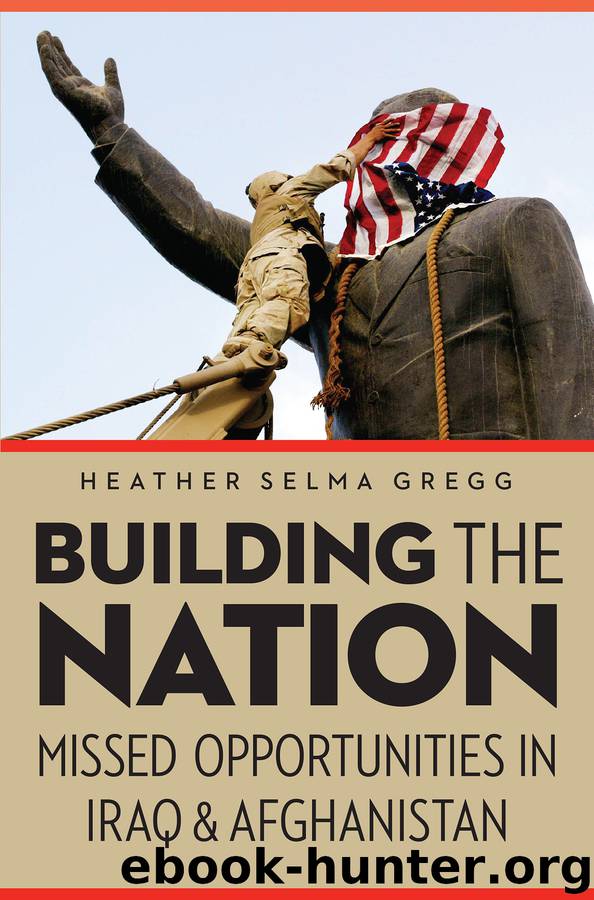Building the Nation by Gregg Heather Selma;

Author:Gregg, Heather Selma;
Language: eng
Format: epub
Tags: POL011000 Political Science / International Relations / General, HIS026030 History / Middle East / Iraq, HIS026000 History / Middle East / General
Publisher: Potomac Books
A Pillar of National Unity
Finally, coalition forces should have worked with national entrepreneurs to institute programs that aimed to specifically work on fostering the Iraqi nation and leveraging the population’s desire to keep Iraq unified. This pillar and its programs were almost wholly missing from plans to “nation build” in Iraq. As described in chapters 2 and 3, nations are not organic products of a group but rather are the result of conscious efforts to consolidate and meld members into an “imagined political community” that has a shared sense of past and destiny. This program of national-unity building, which would have helped pave the way for civic nationalism, should have not only capitalized on the functional aspects of the state to foster the nation but also developed programs aimed at creating in Iraqis an emotional sense of connection to one another and to the country.
First, occupying powers should have made the effort to find national entrepreneurs, to reach out to Iraqi intellectuals, and other local leaders and elites in order to help develop programs that would strengthen the Iraqi nation. Although undoubtedly intellectual freedom and the arts suffered under the rule of Saddam Hussein, academics, artists, and sports heroes have historically been some of the most defiant leaders in the face of oppression and occupation. Examples of individuals could have included sports figures, musicians, poets, TV personalities, even fashion designers. Moreover, occupying powers should have called on famous Iraqi exiles not to run the country but to help rally the people through art, music, and sports. Together, these intellectuals and high-profile figures could have helped foster a program of national-unity building that would have leveraged preexisting social and cultural icons and allowed Iraqis to lead the way.
Second, occupying powers should have worked with intellectuals to find points of pride shared by most, if not all, Iraqis. While often controversial, ancient history could have provided a common rallying point for Iraqis. Mesopotamia’s rich history as the “cradle of civilization” alongside is millennia of empires and the art and other artifacts they created could have been one potential point of shared pride among Iraqis. As noted in chapter 5, the looting of Iraq’s national museum in the days following the 2003 invasion destroyed not only artifacts but also a potential symbol of Iraqi pride.
Furthermore, a plan to return Baghdad to its rightful place as one of the great cosmopolitan cities of the world could possibly have been another rallying point for the Iraqi nation. Post-invasion Iraq presented a unique opportunity not just to rebuild crumbling infrastructure and a capital city but also to make these functional aspects of the state beautiful symbols of the nation. During the Great Depression, the United States government created the Public Works Administration (PWA) as part of the National Recovery Act of 1933, which aimed to put the country to work building infrastructure and public buildings. This initiative created not only bridges, dams, and buildings but also national landmarks that persist in the twenty-first century, such as the Triborough Bridge and the Lincoln Tunnel in New York.
Download
This site does not store any files on its server. We only index and link to content provided by other sites. Please contact the content providers to delete copyright contents if any and email us, we'll remove relevant links or contents immediately.
| Africa | Americas |
| Arctic & Antarctica | Asia |
| Australia & Oceania | Europe |
| Middle East | Russia |
| United States | World |
| Ancient Civilizations | Military |
| Historical Study & Educational Resources |
Empire of the Sikhs by Patwant Singh(22762)
The Wind in My Hair by Masih Alinejad(4839)
The Templars by Dan Jones(4556)
Rise and Kill First by Ronen Bergman(4543)
The Rape of Nanking by Iris Chang(4022)
12 Strong by Doug Stanton(3418)
Blood and Sand by Alex Von Tunzelmann(3055)
The History of Jihad: From Muhammad to ISIS by Spencer Robert(2504)
Babylon's Ark by Lawrence Anthony(2427)
The Turkish Psychedelic Explosion by Daniel Spicer(2245)
No Room for Small Dreams by Shimon Peres(2235)
Gideon's Spies: The Secret History of the Mossad by Gordon Thomas(2230)
Inside the Middle East by Avi Melamed(2230)
Arabs by Eugene Rogan(2193)
The First Muslim The Story of Muhammad by Lesley Hazleton(2153)
Bus on Jaffa Road by Mike Kelly(2034)
Come, Tell Me How You Live by Mallowan Agatha Christie(2024)
Kabul 1841-42: Battle Story by Edmund Yorke(1921)
1453 by Roger Crowley(1879)
